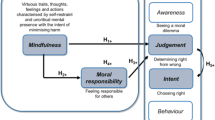Abstract
Many people believe in the intention principle, according to which an agent’s intention in performing an act can sometimes make an act that would otherwise have been permissible impermissible, other things being equal. Judith Jarvis Thomson, Frances Kamm and Thomas Scanlon have offered cases that seem to show that it can be permissible for an agent to act even when the agent has bad intentions. If valid, these cases would seem to cast doubt on the intention principle. In this paper, I point out that these cases have confounding factors that have received little attention in the literature. I argue that these confounding factors undermine the putative force of these cases against the intention principle. Indeed, when cases without these confounding factors are considered, it becomes clear, so I argue, that intentions can be relevant for the permissibility of an act.
Similar content being viewed by others
Author information
Authors and Affiliations
Corresponding author
Rights and permissions
About this article
Cite this article
Liao, S.M. Intentions and Moral Permissibility: The Case of Acting Permissibly with Bad Intentions. Law and Philos 31, 703–724 (2012). https://doi.org/10.1007/s10982-012-9134-5
Accepted:
Published:
Issue Date:
DOI: https://doi.org/10.1007/s10982-012-9134-5



